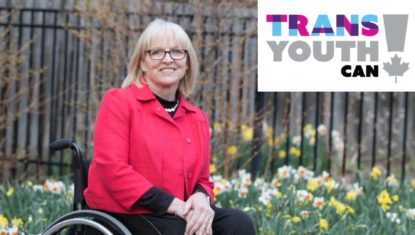26/07/2022
Ottawa, Ontario — Tuesday July 26, 2022

Understanding the mental health realities of transgender and non-binary adolescents seeking gender-affirming medical care in Canada is an important field of research required to improve care and support these youth.
Margaret Lawson, Senior Scientist at the CHEO Research Institute, is the co-principal investigator and clinical lead for the Trans Youth CAN! study – a first-of-its-kind study that followed and examined the experiences of transgender youth in Canada.
The cohort study funded by the Canadian Institutes of Health Research (CIHR), explores the medical, social and family experiences of 174 transgender and non-binary youth seeking gender-affirming care at 10 specialized gender clinics across Canada. The study follows youth and their parents/guardians over a two-year period from their first clinic visit to discuss initiation of medication to put a hold on puberty, which would have happened when they were under the age of 16.
The first publication of many that will come from this in-depth study was published in Pediatrics in November 2021 and reports on the experiences of trans youth seen for gender-affirming medical care. The findings of the study’s first publication are poignant and highlight the need for more research on, and support for, transgender and non-binary adolescents in Canada and the mental health realities they face, which are made worse by long waits to access gender-affirming care.
“The adolescents participating in Tran Youth CAN! had high levels of parental support and yet still waited almost four years to receive gender-affirming care,” said Lawson, an endocrinologist at CHEO and Professor of Pediatrics at the University of Ottawa. “At their first visit for gender-affirming care, depression was high and anxiety even higher, with 67.6% engaging in self-harm in the previous year, 34.5% having suicidal ideation, and 16.8% had one or more suicide attempts.”
Trans and non-binary youth in Canada need better access to gender-affirming care and mental health support. Trans Youth CAN! found that when transgender youth wait longer for their first visit to consider hormone suppression or gender-affirming hormone therapy, their likelihood of having anxiety, self-harm, suicidal thoughts, and suicide attempts increased significantly.
Gender diversity referrals increased each year at CHEO from 210 in 2019 to 280 youth in 2021, with wait lists increasing from 210 to 321 youth. As wait times for gender affirming medical care continues to increase across the province, so does the risk of anxiety, self-harm, suicidal thoughts and suicide attempts among these youth, as noted in the study.
Delays in access to mental health support were identified in the Trans Youth CAN! November 2021 Pediatrics publication. The report uncovers a lack of community care resources and highlights a now-urgent need for increased resources to provide access to gender-affirming medical care to transgender and non-binary youth. Every day matters in the life of a child; and, for vulnerable youth, every day of delay could have life-limiting consequences up to and including suicide.
Trans Youth CAN! findings:
- 9 year average wait to receive gender-affirming care for the 174 adolescents (79% assigned female at birth) participating in the study
- 66% were aware of their gender before age 12
- 0% of the adolescents reported strong parental support for their gender identity.
- Depression was high and anxiety even higher at 51.9%,
- 6% engaging in self-harm in the previous year
- 5% having suicidal ideation
- 8% had one or more suicide attempts
- 47% said they did not feel safe in school washrooms
- 63% reported avoiding school locker rooms and washrooms
- 38% reported avoiding school to avoid harassment, transphobia or discrimination.
- 10% of adolescents reported that they had missed two or more weeks of school for reasons related to their gender, such as their mental health, being bullied/harassed, misgendered or outed.
- 41% of parents reported they had to get involved in their adolescent’s school regarding gender issues with 27% reporting they had to defend their adolescent’s right to use a washroom
- 14% of parents reported that their adolescent had to change schools because others had issues with their gender
- Another 28% had considered changing schools for these reasons.
Read the full 2021-2022 CHEO Research Institute Annual Report.
